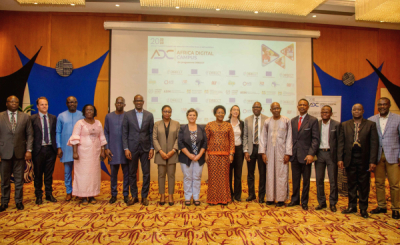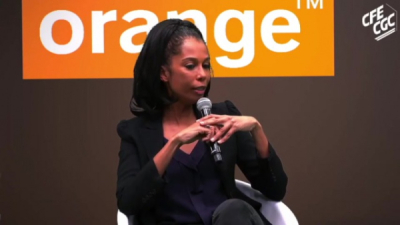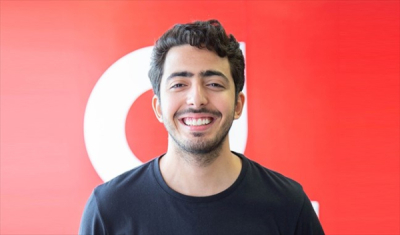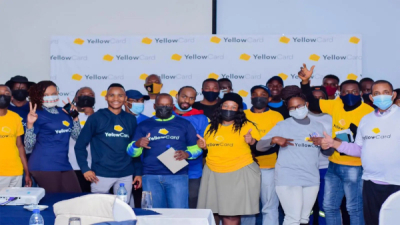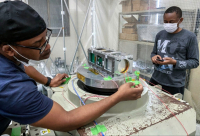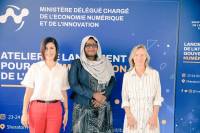The developer of the innovative tool is passionate about digital technologies given their importance in helping address key issues. He sees Nkwa as a way to improve the population’s financial discipline.
Nkwa is a web and mobile - available for Android and iOS devices- financial solution developed and launched by Cameroonian tech entrepreneur Akwo Ashangndowah in 2020. It allows users to regularly save money directly from their mobile phones simply and more safely for their future projects.
To start saving with Nkwa, users need to register and set specific targets, including duration or overall amount to save. Once the targets are set, the user can start saving via mobile money.
Like bank savings accounts, Nkwa offers a yearly 3% interest rate for amounts saved. In case of an emergency, users can withdraw the amounts they saved without waiting for their set targets or amounts. However, in that case, the startup applies a 5% penalty on the amount withdrawn.
In 2021, Akwo Ashangndowah explained that Nkwa helps users have a clear view and control over their money and the things they want to achieve with the savings since they are not required to make big savings.
Nkwa is an initiative of Maealth Tech Limited, an innovative company founded and led from 2015 to 2020 by Akwo Ashangndowah, who has also worked in the health technology. In October 2022, the startup was selected as one of 15 African fintech startups that will participate in the fifth edition of "CATAPULT: Inclusion Africa" organized by the Luxembourg House of Financial Technologies (LHoFT). The start-up will also participate in the Arch Summit taking place on October 26-27, 2022.
Melchior Koba
He spent a large part of his professional career in the entertainment industry. Two years ago, he founded a startup to combine his passion for teaching and his experience in the entertainment industry.
Patrick Mungai (photo) is a Kenyan accountant and entrepreneur. He is also the co-founder and CEO of the game development firm mSwali, founded in 2020. The firm develops and promotes mobile games that build users’ skills.
The firm’s flagship product is mSwali Quiz, a game that can be played either by dialing a USSD code or directly on its dedicated platform. The quizzes are focused on African countries and various rewards are offered to the best players.
“There are very few mobile-based learning games focused on the African adult population & instead, we currently have a proliferation of hundreds of betting & gambling platforms across the continent. mSwali aims to counter this by attracting this population through adopting its learning games to the existing user behavior,” Patrick Mungai said in 2021.
This year, he registered mSwali at the MEST Africa Challenge to attract additional financing to take the firm to its next development stage. On October 22, 2022, it was among the 10 semi-finalists in the competition, which would entitle the two winners to a check of US$50,000 each.
Since 2013, the entrepreneur is the director of the training institution Dimension Business Institute. He started his professional career as an Assurance and Advisory Associate at the professional services network KPMG. In 2006, he joined the network’s IT advisory team.
In 2011, the entrepreneur became the executive director of the South African marketing company WSI-BIZ. About three years later, MultiChoice Group hired him as head of DStv Digital Media for West Africa. During his time with the broadcasting company, his team developed and rolled out digital entertainment products such as DStv Now, Box Office, and Explorer Decoder's Catch Up. From 2017 to late 2020, he worked for on-demand video service Showmax, as head of growth in East Africa.
Melchior Koba
Many African countries have embraced remote education to address the challenges related to education in their education systems. However, the unavailability of infrastructure and advanced services that would enable easy access to remote learning remain major issues.
On Tuesday, October 25, Benin officially launched the Africa digital Campus project. The consortium agreement for the implementation of this project was signed by the Institute of Research for Development (IRD), the Agence Universitaire de la Francophonie (AUF), the French Development Agency (AFD), the Virtual University of Burkina Faso and the Agency for Information Systems and Digital (ASIN).
The project, funded by AFD and carried out by IRD and the West and Central African Research and Education Network (WACREN) in partnership with the AUF, aims to promote the continuity and quality of higher education in West Africa by improving local universities’ network infrastructure and e-learning offering.
"In its pilot phase, the Africa Digital Campus project will allow the deployment of distance learning by strengthening the e-learning offer of two universities in West Africa: the Virtual University of Burkina Faso (UVBF) and the National Institute of Industrial Technology of Lokossa (INSTI), Benin,” the Beninese government explains.
The two-year project will strengthen the online training offer, the development of digital infrastructure, and access to connectivity within the two targeted higher education institutions in a post-Covid-19 context.
It is in line with the Beninese government’s plan to develop digital technologies to improve higher education. It will impact a thousand students in the country. The project complements government initiatives such as the Beninese Education and Research Network (RBER). In its pilot phase, the RBER allowed the interconnection of ten universities with services such as connectivity, IP telephony, and videoconferencing; and the e-Learning project, in its pilot phase.
Samira Njoya
Africa is currently home to a burgeoning innovative youth population, increasingly looking for support in their entrepreneurship. Orange, which believes in the social impact of technology companies, is more than ever committed to supporting them through various actions.
iRole!, Kamioun, Biomass4GLC, LifeBlood, and Abana are the winners of the international phase of the twelfth edition of the Orange Social Venture Prize 2022 in Africa and the Middle East (POESAM). The winners were unveiled, today, October 26 in Kigali, Rwanda, on the sidelines of the Mobile World Congress Africa, which takes place from October 25 to 27, 2022.
The International Women's Prize went to the Jordanian start-up iRole!, which wins €20,000 for its digital platform that connects women looking for remote work with organizations looking for workers.
The International Grand Prize was won by Sierra Leonean start-up LifeBlood, which won a check of €25,000 for its digital health platform designed to solve the acute shortage of blood products in the country's healthcare delivery system.
The second prize of €15,000 was won by the Malian start-up Biomass4GLC, which specializes in the production and distribution of cooking biogas through the leasing of connected devices.
Finally, the third prize of €10,000 went to the Tunisian company Kamioun, which offers an e-commerce platform that helps retailers easily source products in Tunisia.
For the second time in 12 years, POESAM awarded a special jury prize to a start-up that stands out for its impact. The prize went to Abana, a digital marketplace from the Democratic Republic of Congo dedicated to clothing designers and buyers, which won the sum of €10,000.
During the award ceremony presided over by Elizabeth Tchoungui (photo), MD of Orange Foundation, and Brelotte Ba, Executive Vice President of Orange Middle East & Africa, it was revealed that nearly 1,400 applications were received from the 17 countries that took part in this year’s edition of the POESAM.
From 2011, when POESAM was launched, to date, Orange has spent over €600,000 to support more than 30 winners and facilitate access to its experts and partners for more than 90 entrepreneurs.
Since his childhood, he has been passionate about technology and video games. He taught himself basic computer skills using internet resources and, over the years, he honed his skills to the extent that he is now a multi-award-winning tech entrepreneur.
Yahya Bouhlel (photo) is a young Tunisian computer scientist and tech entrepreneur. With his brother Amine Bouhel, he founded GoMyCode, in 2016, to train young Africans in digital skills for their well-being.
The startup has a “blended education model,” teaches in twelve local languages, and is positioning itself as a regional leader, the tech entrepreneur explained last January, when GoMyCode raised US$8 million to scale operations in eight countries where it is already operational. At the time Yahya also indicated the startup was planning to enter 12 additional markets by 2024.
Since his childhood, Yahya is a tech and video game enthusiast. The self-taught computer scientist started developing digital products at 13. In 2014, when he was 15, he traveled to the United States for a summer internship at the computer science college Make School, which noticed his work, including websites, applications, software, and algorithms. During the internship, he improved his game development skills and even developed Mandown, a game he sold to Appstore.
Over the four following years, he made several trips to Silicon Valley and participated in many Hackathons. He also had the opportunity to learn and network with developers and other actors of the tech ecosystem.
The GoMyCode idea was born in 2015, after the start-up boom in Silicon Valley. Indeed, while Silicon Valley was booming, in Tunisia, the ecosystem was almost unexisting. Yahya then decided to create a summer bootcamp, a three-week program during which young people would learn to develop video games. The project has evolved over the years, with GoMyCode training more than 10,000 developers, from children to seniors.
From 2015 to 2016, Yahya Bouhlel participated in Y Combinator’s incubation program at the University of Standford. In 2017, he was an intern product manager at Upgraded Technologies.
In 2015, he won an honorable mention at the Youth Entrepreneurship Summit held in Delaware. At Make School, he also won first place in the Pebble AngelHacks Silicon Valley sponsor. With GoMyCode, he won the first Social Enterprise Award issued by the BIAT Youth Foundation and the MIT Enterprise Forum Pan Arab. About two years later, the World Economic Forum (WEF) named GoMyCode among the 100 Arab start-ups shaping the Fourth Industrial Revolution in the Middle East and North Africa (MENA).
Melchior Koba
Africa is gradually establishing itself as one of the strong cryptocurrency markets. This makes complying with national and international regulations a requirement for actors looking to capitalize on the market.
Pan-African cryptocurrency exchange Yellow Card announced, Tuesday, it secured a virtual asset service provider license to operate in Botswana. The license, per Section 11 of the Virtual Assets Act 2022, was issued by the Non-Bank Financial Institutions Regulatory Authority (NBFIRA) on September 29, 2022, and will become the standard for crypto operations in the country.
The license officially authorizes Yellow Card to facilitate bitcoin sales and purchases for its users in Botswana. According to Chris Maurice, CEO, and co-founder of Yellow Card, this is an important milestone for the company, as it will open up "greater channels of expansion with regards to payment partners, banking and expanding our client base across Africa.”
“This will further show regulators in other markets that we are not just any other cryptocurrency company – we are pioneering, pushing boundaries, and setting the standard. All the more reason for them to work together with us as well,” he added.
Botswana is one of the few countries in the world to take significant steps to regulate cryptocurrencies and digital tokens. Last February, the government passed a bill to regulate cryptocurrency and digital token trades in the country, all in a bid to combat money laundering.
Despite its about two million population, Botswana has significant purchasing power thanks to its currency (the pula), which is stronger than most African currencies. The population is constantly looking for innovation, hence the adoption of digital currency. According to gobitcoin.io, an African Bitcoin news site, Botswana is one of the top Bitcoin users in Africa alongside Ghana, Kenya, Nigeria, South Africa, Zimbabwe, and most recently the Central African Republic.
The newly regulated firm, Yellow Card, says it also complies with key global regulations, including anti-money laundering and know-your-customer requirements under the Travel Rule introduced by the Financial Action Task Force.
Samira Njoya
The startup launched in London last August. It operates a 100% electric vehicle lease-purchase model, which gives mobility entrepreneurs access to new zero-emission vehicles for a fixed weekly fee.
Mobility financing startup Moove Africa announced a £15 million, or US$16.9 million financing secured from Emso Asset Management.
The financing will help Moove expand its UK operations after a successful launch in August. The startup also plans to grow to 10,000 vehicles by the end of 2025 and become Uber's largest electric vehicle (EV) partner in London.
“This financing comes at a really exciting time for Moove. With our international expansion underway in the UK and India, we’ve already shown that affordable and accessible vehicle financing for mobility entrepreneurs is a global challenge and one we’re committed to solving at Moove. We’re looking forward to scaling up our operations in the UK to enable drivers to transition to electric vehicles to drive forward the electrification of mobility," commented Ladi Delano, Moove Africa co-founder, and co-CEO.
Last March, the company began its global expansion after raising US$105 million in a Series A2 round of equity and debt financing. It supplemented that funding with US$20 million raised from the U.K. government's development finance institution, British International Investment (BII), formerly known as CDC Group.
To date, the vehicles (cars, trucks, and motorcycles) financed by the fintech startup have completed more than three million trips in nine markets including Lagos, Accra, Johannesburg, Cape Town, Nairobi, and Ibadan.
In London, its operations will help Uber progress toward its goal of becoming an all-electric platform in the UK capital by 2025. To facilitate this transition to EVs in London, Moove has launched Moove Charge, the first end-to-end charging experience and comprehensive EV charging network app specifically for rideshare drivers.
Samira Njoya
Freight transport has become an attractive sector for tech entrepreneurs in recent years. The volume of investment and number of innovations is ever rising to allow timely and affordable deliveries.
Chargel is a digital platform developed by a Senegalese eponymous start-up. It allows truckers to quickly find clients without driving around with empty trucks. It also allows shippers to quickly find truck drivers to transport their goods at affordable prices.
It connects shippers and carriers, and offers value-added services like GPS tracking, discounted fuel purchases, and repair assistance to allow truckers to focus on their “core business and get shipments to their destination.”
Shippers can book available trucks instantly or in advance, track their goods in real time and get electronic proof of delivery.
The startup behind the solution aims to become the largest digital logistics platform in Francophone Africa. Earlier this year, it secured US$750,000 in pre-seed funding to support its growth. It is also hopeful for seed funding, by the end of the year, to scale up.
For Raja Kaul, founder and managing partner of Logos Ventures, one of Chargel's investors, the startup's founders are well "positioned to build Chargel into a leading logistics marketplace in Senegal, and eventually across West Africa."
Adoni Conrad Quenum
Over the years, observation satellites have demonstrated their importance in data collection for effective decision-making. In Africa, which has possibly the lowest number of observation satellites, they can accelerate in several sectors, including agriculture.
Zimbabwe's Zimsat-1 and Uganda's PearlAfricaSat-1 nano-satellites are slated to be launched into space on November 6, 2022. They will be launched from the U.S. National Aeronautics and Space Administration's (NASA) Commercial Space Launch Facility in Virginia. Zimbabwe and Uganda have finalized preparations for the launch, we learn.
The nano-satellites will fly aboard the Northrop Grumman (NG-18 Cygnus), which will deliver them to the International Space Station (ISS). Then, they will be deployed into orbit.
According to Melissa Gaskil of the International Space Station Program Research Office at the Johnson Space Center, "the statistical data collected could help distinguish bare ground from forest and farmland and possibly indicate the quality of agricultural growth."
They could therefore help improve the livelihoods of the citizens of Uganda and Zimbabwe, she added.
The launch of the first Zimbabwean and Ugandan satellites is part of the 5th phase of the joint global multi-nation Birds project (BIRDS-5 project). It is a constellation of two 1U CubeSats (Zimsat-1 and PearlAfricaSat-1) and the 2U CubeSat (TAKA) developed by Japan, which will also be launched into space with African equipment. Fourteen countries have already participated in the BIRDS program, launched in 2015 and led by the Kyushu Institute of Technology (Kyutech).
BIRDS also introduces students from developing countries to satellite development, laying the groundwork for similar space technology projects in their home countries for future sustainable space programs.
“BIRDS-5 performs multispectral observations of the Earth using a commercial camera and demonstrates a high-energy electronic measuring instrument,” we learn.
Muriel Edjo
The D4D project is part of the Horn of Africa Initiative, which aims to identify common cybersecurity and public services digitalization challenges in the Horn of Africa.
Four international institutions recently launched the program Digital for Development ( D4D), which aims to support the digital transformation of countries in the Horn of Africa, in Djibouti. They are namely the European Union, Expertise France (EF), GIZ, and the International and Ibero-American Foundation for Administration and Public Policies (FIIAPP).
The training workshop on the first pillar of its roadmap (Djibouti Smart Nation) began on Sunday, October 23 in Djibouti under the guidance of Minister Delegate in charge of Digital Economy and Innovation Mariam Hamadou (photo, center), and the EU Head of Cooperation in Djibouti, Simona Schlede (photo, right).
“This workshop will provide an opportunity to present the #GovStack approach, the European initiative that helps public administrations build their digital infrastructure networks based on an approach prioritizing and classifying services in interoperable blocks,” reads a Tweet by the European Union’s delegation in Djibouti.
“GovStack building blocks include software components such as security, registration, authentication, digital payments, digital identity, shared data repositories, content management, and data collection,” Mariam Hamadou explained.
The D4D is a 3-year program with an €11 million budget (€10 million will be provided by the European Commission and €1 million by the German Federal Ministry of Economic Cooperation and Development-BMZ). It will benefit three countries, namely, Djibouti, Kenya, and Somalia. It will enable the beneficiaries to undertake the first strategic, institutional, regulatory and humanitarian steps necessary to establish digital government services that can boost regional harmony. It also focuses on cybersecurity reinforcement.
Ten directorates from various Djiboutian institutions have taken part in the workshop. They include the Single Window, the Central Purchasing Center for Essential Medicines and Medical Consumables (CAME), and the Ministry of Labor.
The D4D program is part of the Horn of Africa Initiative launched in October 2019 by the governments of Djibouti, Ethiopia, Eritrea, Kenya, and Somalia. It aims to identify and harmonize approaches to addressing the region's common cybersecurity and public service digitization challenges.
Samira Njoya
More...
In Africa, and possibly in the rest of the world, instant messaging apps are getting more popular. Local entrepreneurs have decided to create alternatives to the foreign apps that have dominated the market up to now.
OnDjoss is an instant messaging app developed by a Cameroonian eponymous start-up. It allows users to chat through instant text messages, and audio and video calls.
"Ondjoss is an instant messaging app made by Africans for the world. It is about providing Africans with a powerful messaging app that they can identify with. The aim is to later compete with similar well-known apps worldwide but, we want to conquer Africa first,” indicates Ondjoss founder, Valere Tchapda.
The mobile app is available for Android devices only. Some users criticize it for being a carbon copy of WhatsApp but, Valere Tchapda says it is not. She explains that unlike other messaging apps (Whatsapp notably), other Ondjoss users can not access other users’ phone numbers in groups they belong to. They can only see usernames. With Ondjoss, users can also send heavy files of up to several gigabytes and save messages to recover later when they misplace their phones.
In 2022, a new feature was added to the app. The feature, called Kongossa, allows peer-to-peer messaging for enhanced privacy.
To register or create an Ondjoss account, users will need to provide their phone numbers and create pseudos. Then, they can chat with their contacts, who also have Ondjoss accounts. The personal data scandal that hit U.S firm Meta and its messaging app, WhatsApp notably, positively impacted OnDjoss userbase. It claims more than 125,000 users and Playstore data shows 100,000+ downloads.
Adoni Conrad Quenum
In Africa, access to conventional financing is most of the time difficult for SMEs and informal traders. Mosabi aims to facilitate that access and also improve its users’ business and financial literacy.
Mosabi is a tech solution developed by a Sierra Leonean eponymous start-up. It helps entrepreneurs, mainly from the informal sector, access financial and business information to manage their business and money better.
“We [...] use visual and audio cues that can reach low-literacy users. Not only does our training help users build practical skills and increase their income, but our lessons and economic incentives are also specifically designed to drive behavior change,” explained Mosabi co-founder and CEO, Chris Czerwonka.
Through its video content, users can study many subjects, including entrepreneurship, business, and financial literacy. Mosabi also uses gamified quizzes, surveys, and conversational agents to enhance the way courses are delivered while considering participants’ literacy to adjust its contents and exams.
“We believe we are creating unique and tangible value from learning, for people excluded from traditional educational pathways, and placing the control back into their hands as we help them understand and improve their creditworthiness,” Chris Czerwonka says.
The startup claims more than 20,000 users in Sierra Leone, Ghana, Kenya, Liberia, Paraguay, and Senegal. According to Czerwonka, within five years, it plans to launch in 20 global south countries and emerge as the “worldwide training platform of choice for lifelong learning aligned with global sustainable development” within ten years. To support its growth plan, it has already raised more than US$150,000.
Its Android app is not on PlayStore, the official app store for Android devices, but, it has already been downloaded more than 10,000 times from APKCombo.
Adoni Conrad Quenum
Since its launch in 2016, the initiative supported by DS Avocats, Honoris United Universities, Inetum, Meridiam, Roland Berger, and Société Générale, has already supported 718 female entrepreneurs.
Women In Africa (WIA), an international platform supporting African women entrepreneurs, unveiled the 51 country laureates of the 6th edition of its annual pan-African entrepreneurial project competition (WIA54) on Tuesday, October 18. For this sixth edition, the platform received more than 7,500 applications and 503 finalists were selected.
“[...]The best candidates from the mentoring and training phase will participate in a Pitch competition in June 2023 that will give them access to investors and seed capital. This will be a unique opportunity to demonstrate business knowledge, convince the jury of the viability of their business project and raise funds to deploy their structure,” the WIA announced previously.
The 51 country laureates “will have the opportunity to join an MBA program of [the WIA] partner Honoris United Universities.” They will “also benefit from a communication highlight worth €5,000 on the WIA social networks” while the best female entrepreneur will also receive a €10,000 prize.
Through WIA54, Women In Africa aims to support 10,000 businesswomen from a range of sectors such as agriculture and agritech, food and foodtech, education and edutech, fintech, environment, and sustainable development, beauty, and creative industries by 2030. The goal is to help create 100,000 jobs and generate US$10 billion in revenue for the African economy.
According to WIA, this focus on women entrepreneurs over the past six years is an expression of its belief in women’s decisive contribution to the continent’s progress.
Muriel Edjo
To successfully implement its 2025 strategic development plan, Gabon is multiplying partnerships to attract investors.
Last Tuesday, Gabon signed a partnership agreement with Asoko Insight to develop virtual DealRoom. The agreement was signed by the Minister of Investment Promotion Hugues Mbadinga Madiya, and Rob Withagen, co-founder and CEO of Asoko Insight two days after the flag-raising ceremony marking Gabon’s entry into the Commonwealth.
The digital platform aims to promote the influx of investments by providing national and international investors with an effective tool for business networking.
“[...] The launch of this digital platform sends a strong signal to investors. […] “it is an innovative partnership for our country. The acquisition of this digital tool makes it possible to promote investments and gives greater visibility to investment projects. It also allows for fluidity of information in terms of programs, reforms, and opportunities, as well as data on the profile of investors,” said Minister Mbadinga Madiya.
Gabon is a secure business environment that provides access to a regional market of 180 million consumers. It presents business opportunities in the energy, health, education, timber, fisheries, agriculture, and services sectors. In 2019, Forbes ranked the country as the 37th and 147th best country for business respectively in Africa and in the World.
The platform is expected to promote investment, give greater visibility to investment projects, and allow a great flow of information on programs, reforms, opportunities, and data.
It “will result in a faster investment process, which will have the advantage of building Gabon’s reputation as a business destination and of increasing the flow of FDI in Gabon,” the Investment Minister added.
Samira Njoya




